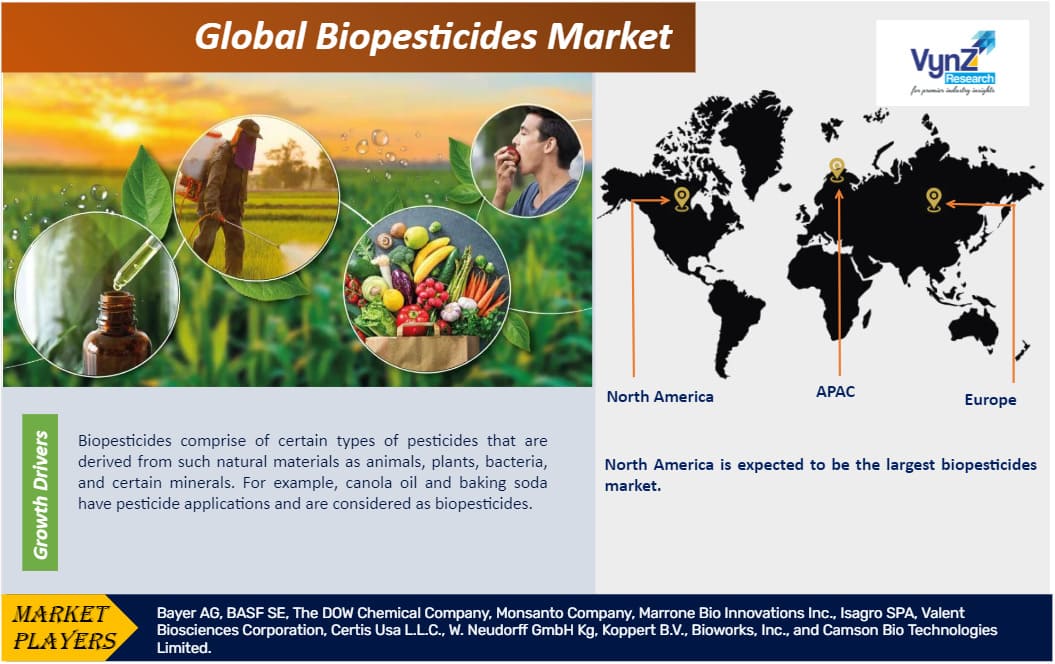Industry Overview
The global biopesticides market is expected to grow from USD 4.6 billion in 2023 to reach USD 7.5 billion by 2030 at a CAGR of 15.3% within the projected period from 2025 to 2030.
Biopesticides refer to specific types of pesticides derived from animals, plants, bacteria, and a few particular minerals. They help commercial growers in producing healthy and affordable crops. The biopesticides usually use targeted modes of action. This allows commercial growers to preserve beneficial insect or natural predator populations in their fields and also helps relying less on traditional chemical pesticides. So, the benefit of using biopesticides in agriculture is related indirectly to the health of humans being an integral aspect of integrated pest management programs.
The global biopesticides market is growing significantly due to the wide range of benefits offered to commercial growers, shippers, food processors, retailers, and end users. Moreover, they make a handsome contribution in the field of food and also in different applications for managing diseases and mosquito controlfor the betterment of public health.Biopesticides also help in the protection of forests, turf, and ornamentals. All these features push it demand and adoption and its market as a consequence.

The growth of the global biopesticides market is somewhat restricted due to the lack of awareness about the benefits of using them. However, significant growth opportunities are offered to the market due to thew increasing growth in bio-control seed treatment solutions.
Biopesticides Market Segmentation
Insight by Type
The global biopesticides market is divided on the basis of type of biopesticides into bioinsecticides, bio fungicides, bioherbicides, bionematicides, and other segments. Among these categories, the bionematicides segment is expected to grow at the higher rate during the forecast period due to their widespread adoption and usage in seed treatment and the rising focus on new product development of bionematicides by crop protection companies.
Insight by Crop Type
The global biopesticides market is divided on the basis of crop type into grains & oilseeds, fruits & vegetables, and other segments. The demand for biopesticides in the fruits and vegetables category remained the highest during the historical period and is also expected to contribute the largest share during the forecast period due to higher consumer demand and consumption of fruits and vegetables that are pesticidefree. It is also attributed to the growing adoption by the marketers.
Insight by Mode of Application
The global biopesticides market is divided on the basis of application into seed treatment, soil treatment, foliar spray, and post-harvest segments. During the forecast period, the market for application of biopesticides via foliar spray is expected to grow at a higher rate due to easy availability and the lower cost in comparison to other categories. It is also attributed to the convenience in use and the ability to help in covering the overall area of the leaf. Moreover, the growth is also facilitated due to its ability to cutdown the problems related to leaching in soils.
Insight by Origin
The global biopesticides market is divided on the basis of origininto microbial pesticides, biochemical pesticides, plant-incorporated protectants, and beneficial insects segments.Out of all these segments, the segment that is likely to witness higher growth during the forecast period in the microbial pesticides category due to the growing demand for sustainable agricultural practices and its ability to provide environmentally friendly solutions. They are also very effective in pest management and reduce harmful effects caused to the beneficial organisms due to their use. They also reduce chemical residues. The growth of the segment is also attributed to the increasing regulatory support and consumer preference for organic products.
Global Biopesticides Market Report Coverage
|
Report Metric
|
Details
|
|
Historical Period
|
2018 - 2023
|
|
Base Year Considered
|
2024
|
|
Forecast Period
|
2025 - 2030
|
|
Market Size in 2024
|
U.S.D. 4.6 Billion
|
|
Revenue Forecast in 2030
|
U.S.D. 7.5 Billion
|
|
Growth Rate
|
15.3%
|
|
Segments Covered in the Report
|
By Type, By Crop Type, By Mode of Application, By Origin, By Formulation
|
|
Report Scope
|
Market Trends, Drivers, and Restraints; Revenue Estimation and Forecast; Segmentation Analysis; Impact of COVID-19; Companies’ Strategic Developments; Market Share Analysis of Key Players; Company Profiling
|
|
Regions Covered in the Report
|
U.S., Canada, U.K., Germany, France, Italy, Spain, Russia, China, Japan, India, Australia, Thailand, South Korea, Brazil, Mexico, Argentina, Saudi Arabia, U.A.E., South Africa, Nigeria)
|
Industry Dynamics
Industry Trends
The growing consumer awareness and demand for organic food is as safer alternatives to synthetic chemicals is a notable trend of the global biopesticides market. There are also significant developments noticed in biotechnology that has enhanced the efficiency and specificity of biopesticides. In addition, the favorable government policies and support are promoting sustainable agricultural practices and reducing chemical residues on crops. Other notable trends in the industry include the increased adoption in emerging economiesdue to growth in agricultural productivity and regulatory changes favoring environmentally friendly solutions as well as collaborations between biotech companies, agricultural input providers, and research institutions.
Biopesticides Market Growth Drivers
The growing awareness among people regarding the hazards associated with the use of chemical pesticides is one primary factor for the widespread use of biopesticides and its market growth.The expansion of the global biopesticides market is also attributed to the rising demand for organic food and the drastic decrease in the use of synthetic fertilizers due to the harmful effects on human health. Biopesticides are considered to be a far better and friendlier option for non-targeted species and to eliminate the chances of negative health effects on humans. Another significant factor for the growth of the market is the reduced cost of production for the commercial growers because the biological pesticide products occur in a natural manner. These are therefore relatively cheaper as compared to chemical pesticides since the cost of manufacturing is low. In addition, several government programs to grow the awareness of the biopesticides are resulting in higher preference as compared to the chemical pesticides among the growers to implement them in their agricultural activities.
Biopesticides Market Challenges
The widespread expansion of the global biopesticides market is hindered due to the lower adoption rate of biopesticides especially in the agricultural sector in some economies. In addition, the limited efficiency of a few specific type of biopesticides, strict regulatory requirements for approval and registration, lack of awareness and misconceptions about effectiveness, higher production and application costs, challenges in scaling up production and distribution networks due to supply chain issues, need for specialized knowledge and skills for effective application, and compatibility issues with existing farming practices and integrated pest management systems are come other hindrances to the growth of the global biopesticides market.
Biopesticides Market Opportunities
One significant growth opportunity of the global biopesticides marketis the higher preference and adoption of essential oil-based insecticides in organic agriculture. The widespreadobtainability of essential oils from the flavor and fragrance industries has expedited commercialization of essential oil-based pesticides and is therefore driving the growth of the global biopesticides market.
Biopesticides Market Geography Overview
The North American market is expected to hold the largest share of the market and will grow more during the forecast period because biopesticides help the region to promote healthy crops. This increases the frequency of sales of the commercial crops. In addition, the growing demand for organic food and stringent food safety regulations are major factors driving the growth of the North American biopesticides market.
The Asia-Pacific market will grow due to rising awareness among farmers and consumers about the harmful effects of chemical pesticides on health and the environment, government initiatives and support to promote sustainable agricultural practices, growing demand for organic food and expanding organic farming sector, continuous advancements in biotechnology, and rapid economic growth in developing countries such as India and China.
Biopesticides Market Competitive Insight
Some of the key players operating in the global biopesticides industry are Bayer AG, BASF SE, The DOW Chemical Company, Monsanto Company, Marrone Bio Innovations Inc., Isagro SPA, Valent Biosciences Corporation, Certis Usa L.L.C., W. Neudorff GmbH Kg, Koppert B.V., Bioworks, Inc., and Camson Bio Technologies Limited.
Bayer AG produces and markets healthcare and agricultural products. The Company manufactures products that include aspirin, antibiotics, anti-infectives, cardiovascular, oncology, central nervous system drugs, over-the-counter medications, diagnostics, and animal health products, as well as crop protection products, plastics, and polyurethanes.
BASF SE, an initialism of its original name Badische Anilin- und Sodafabrik, is a European multinational company and the largest chemical producer in the world.
Recent Developments by Key Players
BASF together with the world’s first castor bean program Pragati, introduces certified traceability for bio-based solutions in footwear. Pragati was established with the unified sustainability code SuCCESS (Sustainable Castor Caring for Environmental and Social Standards) that sets a standard for certified sustainable castor oil.
Valent BioSciences launched the new Venburg Wing at the company’s Melnik and Shafer Biorational Research Center in Libertyville, Illinois.
The Biopesticides Market report offers a comprehensive market segmentation analysis along with an estimation for the forecast period 2025–2030.
Segments Covered in the Report
- Type
- Bioinsecticides
- Biofungicides
- Bioherbicides
- Bionematicides
- Others
- Crop Type
- Grains & Oilseeds
- Fruits & Vegetables
- Others
- Mode of Application
- Seed Treatment
- Soil Treatment
- Foliar Spray
- Post-Harvest
- Origin
- Microbial Pesticides
- Biochemical Pesticides
- Plant-Incorporated Protectants
- Beneficial Insects
- Formulation
Region Covered in the Report
- North America
- Europe
- Germany
- U.K.
- France
- Italy
- Spain
- Russia
- Rest of Europe
- Asia-Pacific (APAC)
- China
- Japan
- India
- South Korea
- Rest of Asia-Pacific
- Rest of the World
- Middle East and Africa (MEA)
- South America
.png)
Source: VynZ Research
.png)
Source: VynZ Research




.png)
.png)